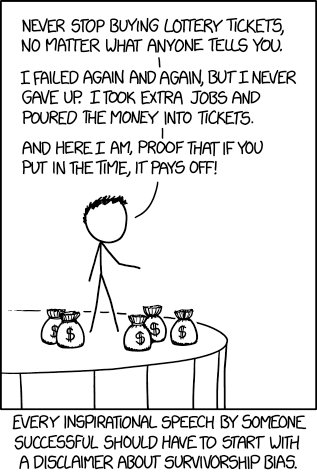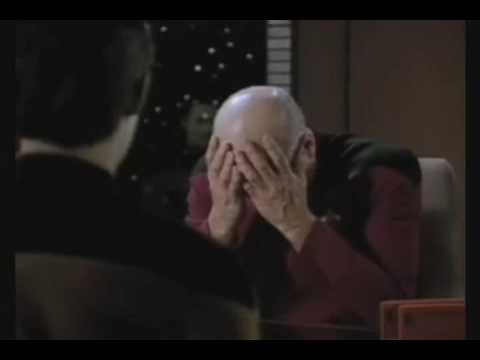
I love this picture. It’s obviously an extreme, but it perfectly captures survivorship bias.
Pray tell, what is survivorship bias?
Survivorship bias is the logical error of concentrating on the people or things that made it past some selection process and overlooking those that did not, typically because of their lack of visibility. This can lead to false conclusions in several different ways. It is a form of selection bias.
And you know who take survivorship bias to an extreme?
Gurus.
No gracias to gurus
If you’ve read my work, you know I have a particular disdain for life coaches and gurus (most, not all). Every so often I’ll come across something so inspiredly insipid I can’t resist but go in.
The latest comes via Simon Sinek, a self-described optimist who sets out to inspire humans via leadership.
To quote:
“Great leaders are those who trust their gut. They understand the art before the science. They win hearts before minds.”
My reaction:

Let’s breakdown the absurdity of a statement.
NOTE: this is isn’t about a particular brand of Guru X or Guru Y (thought I would be remiss to mention how brilliant it was for Tony Robbins to present himself as a contrarian in his “I am not a guru” when it was a two hour informercial for his guru services). This is about how gurus abuse survivorship bias to sell you dreams while profiteering.
The definition of insanity is doing the same thing over and over and expecting a different result
Last year I spoke at BigOmaha (plug: great event – awesome organizers, awesome speakers, awesome attendees). I spoke about VC vs bootstrapping, but was also a panelist on entrepreneurship. I was the old fogey, with 17 years of experience; my two colleagues on the panel were both successful but relative neophytes in the world of entrepreneurship.
(This may come across as me being condescending, but I’m not – they are both awesome ass kickers).
A gentleman came up to the podium. In a voice that gave away his exhaustion, he spoke about how he had an idea/business, had been at it for nine (!!) years, and had not even found a modicum of success. What should he do?
My memory is slightly inexact now, but my two colleagues talked about how one must persevere, even in the face of adversity. How there will always be naysayers, but with enough #hustle, he’d make it.
I then took the mic and said the exact opposite: that the definition of insanity was doing the same thing over and over again and expecting a different result. Perhaps his idea was not a great one. Perhaps the market was not ready (I gave a few examples of businesses ahead of their time in the late 90s, only to have their basic premise become massive successes 15 years later).
I gotta say – people were not impressed. For the rest of the event, I was affectionally deemed to be a curmudgeon (true).
Life is not a fairy tale
One of the most astonishing examples of guru-inspired-faith is some kid named Tony Zaza:
tl;dw – this kid left a job with benefits, sold everything, rode a bike 2000km (from Detroit to St. Petersburg, FL) all because… Elliot inspired him?

Uhh… why not just do some side-hustle? Why not steadily work towards your dream instead of having to upend everything?
He admits he is sans-plan (not always a bad move – my own ad-hoc nature and leverage), but this is just being obtuse.
Hell, if you read about what successful people do, a common theme is planning. And not only that, but they take a measured and calculated approach to what they’re learning, and focus on what will help them attain success
He calls himself courageous, but I think he’s equivocating. With no discernable skill nor expertise, quitting everything and moving to FL will yield… what exactly?
[Yes I’m a bit harsh, but out of compassion, not condescension]
But take Tony’s story to a guru, and they’ll rave about how amazing he is.
How inspirational it is that he followed his dreams – a modern day fairy tale!
But guess what – life isn’t a fairy tale. There is no automatic happily ever after subsequent to your leap of faith.
So what happens once the high wears off? What happens when the evanescent dream dissolves and the reality of the world kicks in?
This is a man who “embraced” his dream… and is living in a tent. A man whose “courage” garnered almost 200,000 views… with a link to a sales page right under it . A man who, when he speaks about how he is gonna work harder than anyone else… results in you seeing a “learn how to make money” ad box.

It would be almost fitting if he watched that ad and then proceeded to click that link and buy whatever was offered.
Yet this is what happens with the non-stop battle cry of #hustle and #grind and this obsession that not following a dream makes you weak and chickenshit. People leave everything behind with nary a plan or idea on how to actually achieve success.
Dreams require planning and skills, not just wishing for it to happen.
Reality does not care for your dreams
I’ve reached a level where more and more people blow smoke up my ass (warning: my giant ego), but the reality is that 90% of my success was that I was born to the right pair of humans that moved from the East to the West (I immigrated to Canadia when I was 14).
My success is predicated on my opportunities. Almost all of my cousins and relatives live in Pakistan and India.
They’re smarter than me.
They work unquestionably harder than me.
Hell, they are certainly more savvy/strategic than I am.
And yet here I am, 100x more successful than them.
Do you want a fun factoid on opportunity? YouTube was banned in Pakistan from 2008 until 2016
The reality is that life is a lottery. Imagine being born in a rice farming village in China and see how successful you become…
This trope that you need to want something and work hard for it is a baseline, not a truism exclusively available to those that made it.
Hard work is a necessary condition for success, not a sufficient one. To think otherwise is to indulge in delusions of grandeur.
It’s a cliche, but “work smarter not harder” should be your goal; working hard is simply the expected baseline.
Reality does not care for your 10,000 hours
Extending the idea that you just need to “work hard,” gurus love invoking the infamous “10,000 hour rule.”
As popularized by Malcolm Gladwell, the maxim became that to become successful at something, one must practice it 10,000 hours.
Three massive errors in this generalization:
- In reality, 10,000 hours was the average, with the standard deviation being ± 2000 hours.
- The 10,000 hours number was not the predictor of high performance; the quality of their practice was the predictor. It’s not about “just” 10,000 hours – it’s about 10,000 hours of deliberate practice.
- The brutal reality is that the people who were mediocre also practiced just as long.
The spread of this misconception is so vast that the original authors were forced to rebut the 10,000 hour rule!
Gurus conveniently focus on the 10,000 hours, but conveniently ignore planning, deliberate practice, and the people who remain mediocre (aka, survivorship bias)
The rise of anti-intellectualism
So we come back to how somehow one must understand art before science.
What a load of poppycock.
What Simon is preaching here is the exact drivel that has lead to the current disaster that is the US administration. It’s the exact logic that Trump embraces – to follow his gut without an iota of knowledge or understanding about the ramifications of your decision.
It’s nonsense captured in balloons of platitudes that will have you soar into the sky towards the stars (with you there for the ride).
These gurus live in their castles-of-enlightenment and are nothing but modern day con artists who don’t give a shit about anyone but themselves. They got some, and hey, if only you worked hard enough, you’d also get some.
There is a strong current of anti-intellectualism in this. That you don’t need to learn. That you don’t need to think and mull and ponder. That you don’t need to collect facts (data) and makes sense of it. That your gut will solve any issues you run into.
But as we went over above, your success is heavily predicated on the opportunities available to you, your underlying talent, and the amount of deliberate practice you put in.
So where does gut come into this? Hell, when was the last time you actually thought about your gut/intuition?
What IS your gut?
Think about your gut the last time you did something uncomfortable? What did your gut tell you to do?
RUN. MAKE AN EXCUSE. FLEEEEEEE!
Your gut is not some form of divinity within you. There’s no pure #blessedness or angelic essence inside you, ready to guide you if only you would listen!
Your gut is something you train. Something you shape. Something you nurture, like anything worthwhile in life (relationships, your health, your knowledge, etc).
Hell, there was a study performed where veterans of law enforcement were asked to ascertain if people were lying or not.
Using just their gut they ended up with… subpar results. From one of the researchers:

Real leaders use data/science to help direct their gut, not use their gut to ignore the reality of the world. There’s a feedback loop you embrace to learn to continually improve (as outlined in the book Black Box Thinking).
When these gurus say to put art before science, what they’re saying is that data/science doesn’t matter. Facts don’t matter. Damn the feedback loop, just keep at it!
Data is the foundation that helps you develop your gut. The science is about trying to understand it.
In no way am I anti-intuition. Your intuition is important. But it’s something you develop with feedback loops and precise practice. Your gut is important… with the caveat that it is developed strategically, not just assumed it’s the source of your success.
And that is the truth about a leader with a strong sense of intuition – it’s based on experience and feedback loops, not “I believe thus it is true.”
Gurus are just savvier astrologers
It’s common practice to make fun of astrologers as experts of ambiguity – that they speak in feel-good bromides and general-truisms so that their words apply to anyone.
How exactly are the gurus any different?
Their general formula is the same – people are lazy and don’t believe, so you should believe, work hard and you’ll get what you want. Just look at me!
What a load of self-indulgent tripe.
There’s a reason why we have Results not Typical. You only see the few who made it (back to survivorship bias); you don’t see the scores of people who tried and tried and ended up with bupkis.
And what’s dangerous is that the people who don’t make it feel like frauds. If only they worked harder. If only they had wanted it more. Then they too could be this made-for-TV success story!
The people who needed help are now in an even-deeper hole!
That’s incredibly damaging.
When discussing the infamous 10,000 hours, we noted that the real predictor is detailed practice. Gurus preach the opposite – to not worry about the details.
And the perfect example to tie it back into the farcical quote about art before science and trusting your gut?
Firewalking.
To the converted, it screams of your faith and how because you believed, you were able to do it.
To the people who use science, it’s obvious – the heat doesn’t transfer fast enough to burn you.
Not to mention, pretty sure before you do the fire walk, your gut says “let’s not do this.”
So uhh… we selectively get to ignore our gut when it fits the guru narrative?

Gurus have perfected the form of being a soothing balm – they placate your insecurities and make you feel better temporarily, but do nothing to actually help you.
Don’t let gurus sell you on survivorship bias
And so we come full circle.
It’s OK to quit.
It’s OK to lose faith.
It’s OK to realize “this may not be for me.”
It is NOT OK to think hard work will automatically yield success.
It is NOT OK to make decisions without any thought or data because you feel it.
It is NOT OK to quit because things got tough, but eventually, as you accrue more knowledge (aka data points and insight), you will be better equipped to make an informed decision.
Too many people associate quitting with failure (ain’t nothing wrong with failure), but that’s simply not true.
As my buddy Ed Leake said, “There’s no shame in quitting something you’re doing today, to start something even better tomorrow.”
In a world of signal and noise, data/science is the signal, and the prattling narcissistic gurus are the noise. Focus on the data, and make educated decisions from what the data tells you.

Leave a Reply